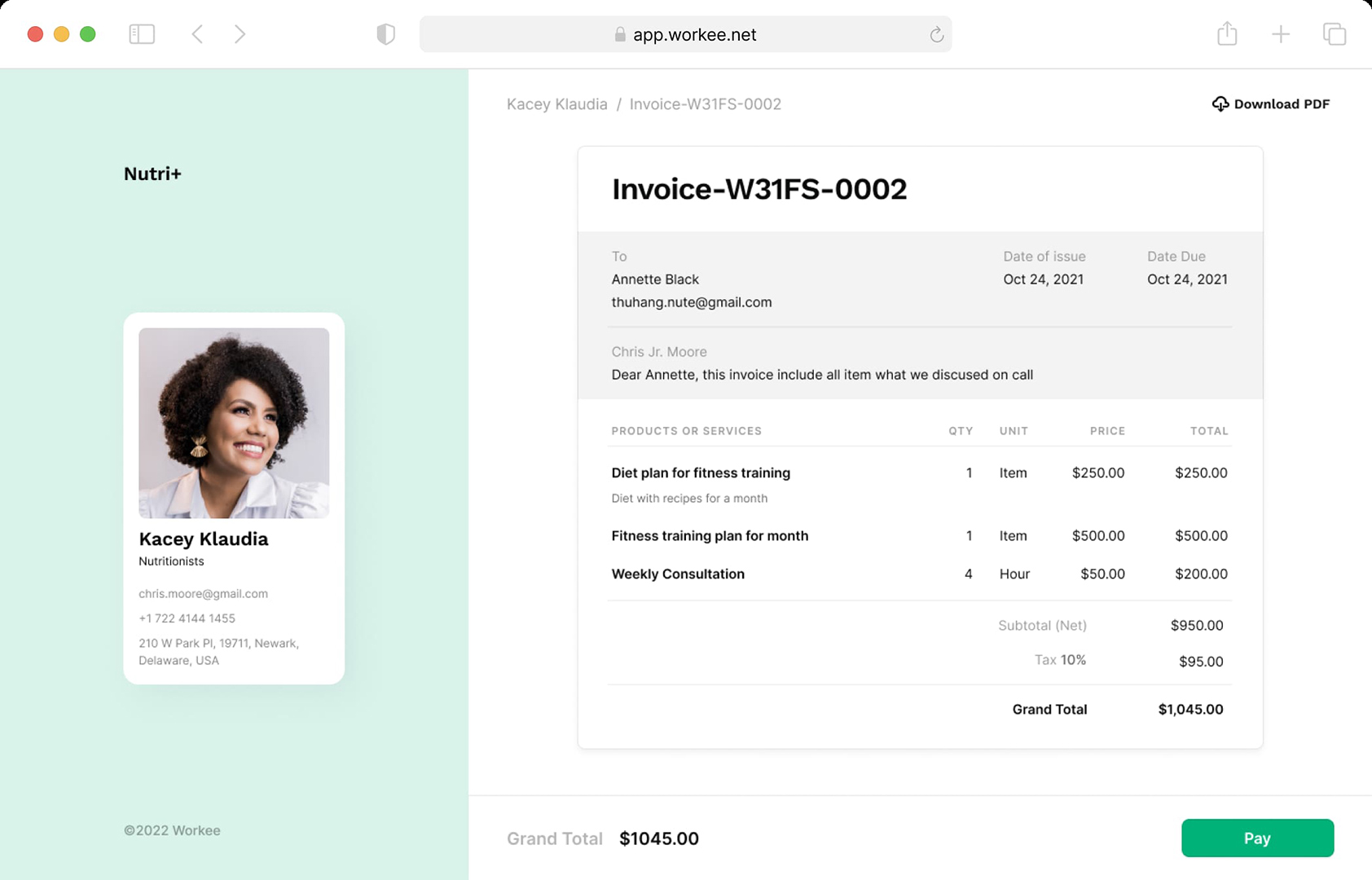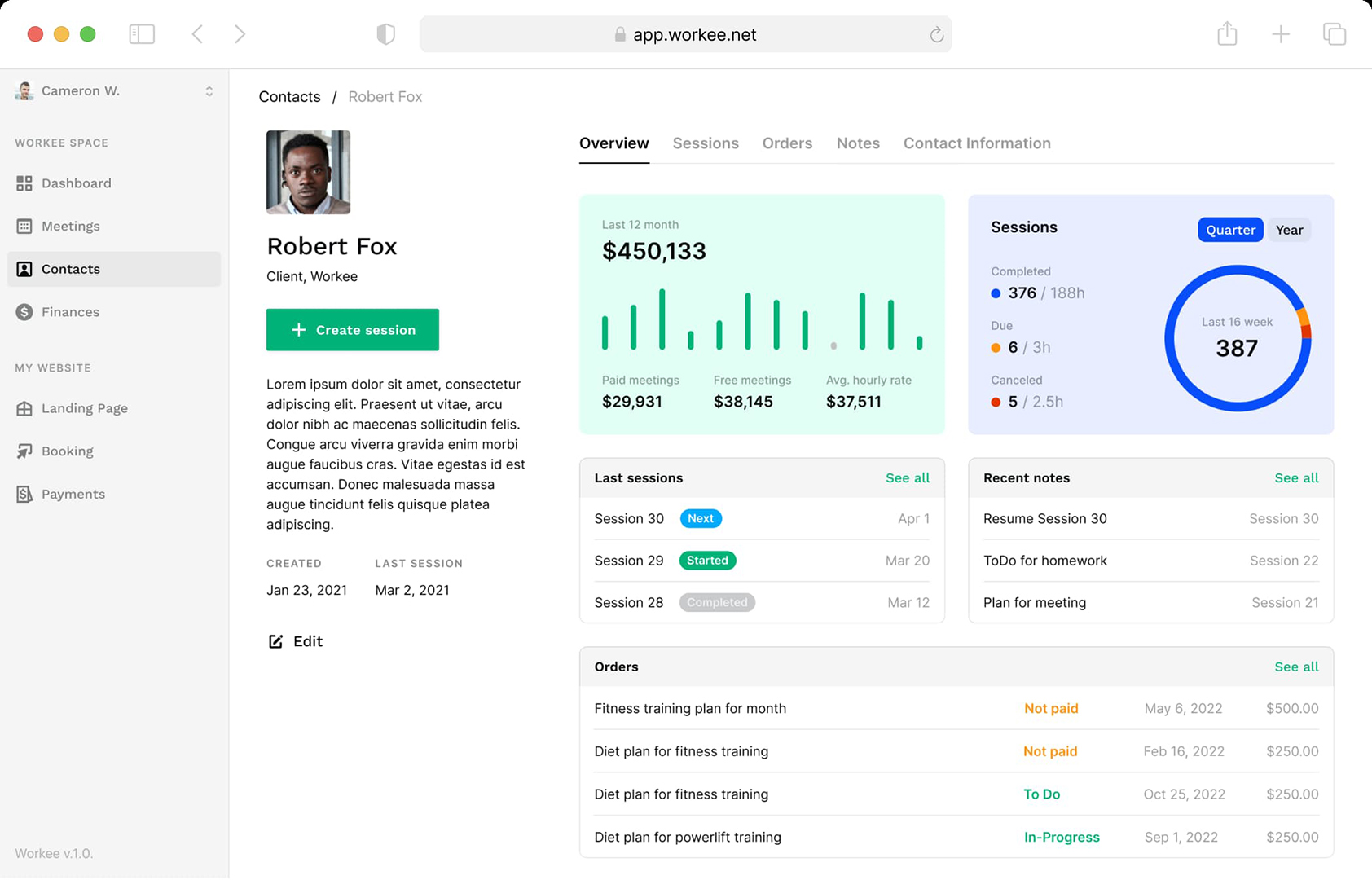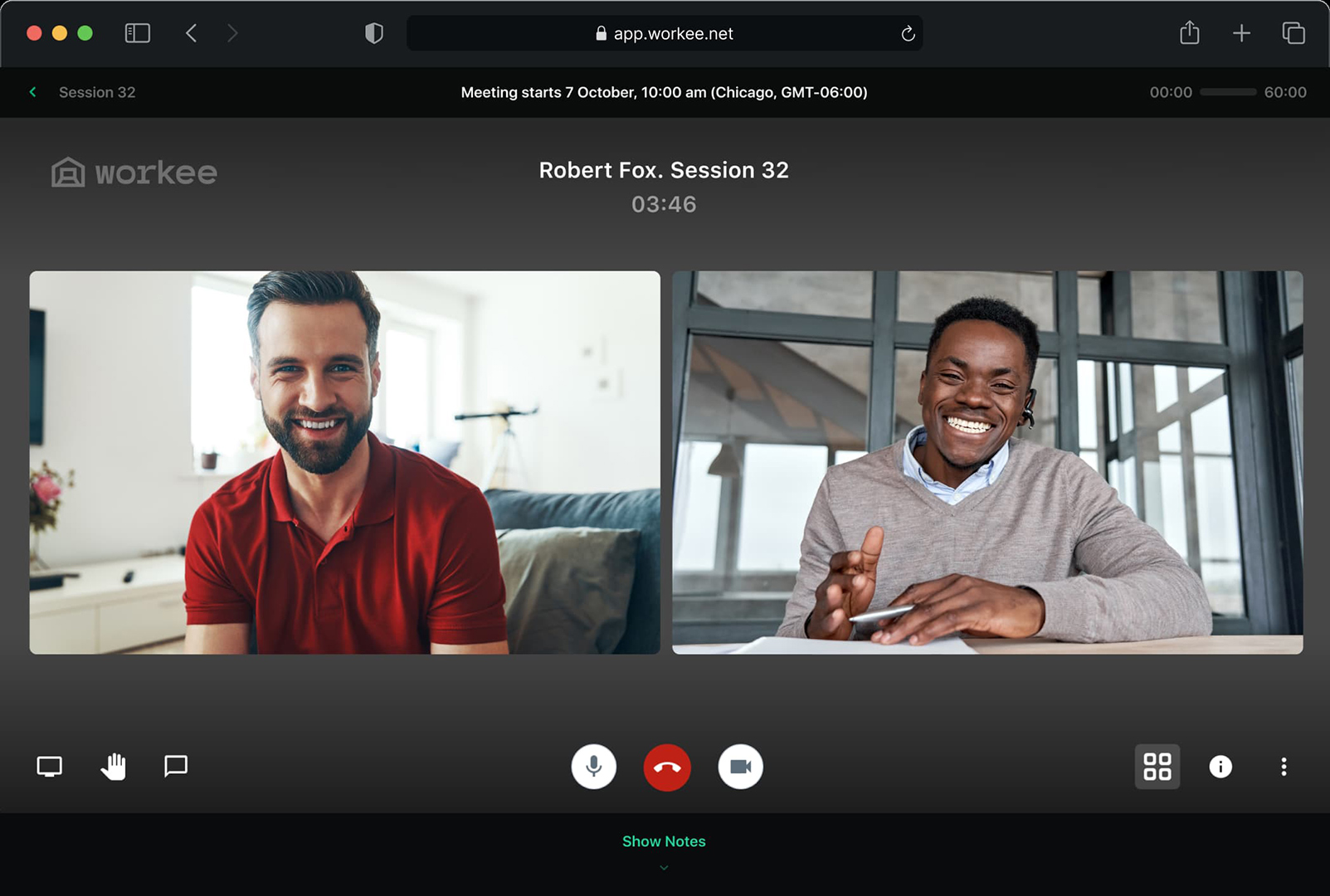- Workee develops a back-office platform that allows freelancers such as therapists or teachers to manage their bookings, clients, payments, and live video calls
- The startup recently raised 600,000 EUR in Pre-Seed and hopes to become a unicorn
- Workee also wants to open an office in the US this year
- Founded in Kiev, the startup relocated to Lithuania, via the Startup Visa Lithuania programme
Ukrainian startup Workee, who helps freelancers manage their online business, is hoping to make its first million this year and to open an office in the United States, after recently having relocated to Lithuania and raised 600,000 EUR in financing.
“Currently, we only have a legal office in the US, but this year we are planning to launch our operations and start our sales team there”, Ihor Bauman, CEO and co-founder of Workee, told ITKeyMedia. He added that the US market, where the startup already has over 1,000 clients, was Workee’s target “from day one”.
Asked when he thinks Workee will surpass the 1 million euro revenue mark, Bauman replied bluntly: “This year!”. He is also optimistic about the prospect of raising more funds. At the beginning of February 2022, the startup received 600,000 EUR in a round led by Lighthouse Ventures, and was backed by BRISE Capital, Startup Wise Guys, as well as Ihar Mahaniok, founder of Geek Ventures. “So far, we are at the Seed stage. Series A could be considered next year”, stated Bauman.
What Does Workee Do?
Workee offers a one-stop-shop back-office platform for freelancers to manage their online business, including – among others – a personal website, booking and scheduling services, online payment and invoicing services, a basic CRM (Customer Relations Management – editor’s note), and live video calls. The Workee platform can thus either replace or integrate with apps or services such as Calendly, Google Calendar/ Contacts/ Docs/ Drive/ Meet, PayPal, Stripe, Wix, WordPress, Zoom.
Who is Workee for? Among the categories listed on their website are coaches, psychologists, therapists, health experts, consultants, legal experts, tutors/ teachers and generally any kind of freelancers.
According to Workee, their no-code software can be set up in 5 minutes and saves their US-based clients at least 4 hours per week and at least 200-400 USD per month.
Image Gallery: Screenshots of Workee’s platform:
1) Presentation website; 2) Bookings; 3) Online payment and invoicing; 4) CRM; 5) Video Calls
The platform is SaaS (Software-as-a-Service) and prices start from 19 USD per month. The subscription drops to 9.5 USD per month for a 12-month plan. The company offers a free 30-day trial.
Bauman says that even a freelancer with 2-3 clients could consider using Workee. “You are creating a story with your clients. You can follow-up with them in the future and build different ways for communication. It is important to have everything tracked from day one”, he added. His pitch for potential clients, including ones that are just barely beyond the ‘not struggling’ threshold, is simple: “A personal website with booking and scheduling. Now everyone has online calls. This is where the journey starts.”
Each client’s personal website is currently hosted on Workee’s servers and the company is planning to offer the option of purchasing top-level domains “in a couple of months, together with the Pro package”. There are no restrictions with regards to the volume of payments and video calls.
16 Times More Users
An interesting find when ITKeyMedia was combing Workee’s website are a few testimonials from graphic designers, but also developers. So we asked why someone working in the field would prefer to ‘outsource’ rather than building their own, tailor-made solution. Bauman feels it is more about saving time. “People really like how everything is combined with the personal website. Booking, scheduling and payments are already available after sign-up. That saves hours or maybe weeks of putting it all together with other solutions”, he explained.
Among the startup’s short-term goals following the investment, Bauman mentions extending to other freelance verticals, adding “dozens of templates” for the personal website module, extending the functionality of the CRM system, and a “full mobile app experience”.
Booking, scheduling and payments are already available after sign-up. That saves hours or maybe weeks of putting it all together with other solutions.
— Ihor Bauman, CEO and co-founder of Workee
Workee also hopes to triple its team of eight people and, more ambitiously, to grow its user base from 3,000 to 50,000.
“Unicorn or Nothing”
However, all the above goals seem to pale in comparison with the startup’s long-term plans. Asked about a potential exit strategy, Bauman sees a couple of directions where Workee could move, but “our ambitions are huge” and “we can see very great potential to become a unicorn.”
His view is shared by Jone Vaituleviciute, general partner of VC fund Startup Wise Guys, who is even more categorical: “Workee will be striving to become a big player, with a value-driven team and strong backup from its investors – it’s either unicorn or nothing!”, she told ITKeyMedia.
Workee will be striving to become a big player, with a value-driven team and strong backup from its investors – it’s either unicorn or nothing!
— Jone Vaituleviciute, general partner of Startup Wise Guys
Vaituleviciute met Workee’s founders when they applied for Startup Wise Guys’ accelerator programme. She really liked the “hustle” of the team and the fact that they are persistent, goal-oriented, and understand their competition very well, “thus finding a good positioning in the market as a result”.
Robert Reich, senior associate at Lighthouse Ventures, was present when Workee was demoing their product for Startup Wise Guys. He was impressed by the team’s focus, motivation, and passion, as well as the way they approached the pain points of freelancers as part of their operational routine.
“Workee is planning to reach 50,000 users this year. The future growth will depend on their execution, of course, but, compared to Upwork (one of the largest freelancing platforms in the world – editor’s note), which has 17 million freelancers on its platform, and taking into account the growth of the market, there are chances for the team to reach Upwork’s figures in the upcoming five years”, he declared for ITKeyMedia.
There are chances for Workee’s team to reach Upwork’s figures in the upcoming five years
— Robert Reich, senior associate at Lighthouse Ventures
Over 1 billion Potential Clients
According to Workee and its investors, there are an estimated 1.2 billion freelancers around the world, accounting for almost a third of the total global workforce. And more and more people are considering and shifting towards freelance work, as a result of the pandemic.
Our three interviewees had the following observations regarding future, short-term trends on the global freelance market:
 Ihor Bauman |
| We see growing freelance figures and a preference for hybrid workspaces. We believe people will be freelancing for different companies all over the world as solo professionals or as a part of agencies. The pandemic gave us the feeling of being independent at home – being your own boss. We are entering a new era of the services market. |
 Robert Reich |
| The trends around freelancing will be all about an independent workspace. Feeling the freedom of working for yourself pushes a lot of professionals to work independently. According to research, the market is going to grow quickly in the upcoming years and solutions for this market will grow accordingly. |
 Jone Vaituleviciute |
| People now are looking for ways to optimize their work on their screens and online. Though there is skepticism that fully online will ever become a thing, the majority of people will prefer to conduct their meetings and appointments online. |
Started in Ukraine, Migrated to Lithuania
Workee was founded in 2020, in Kiev, by Ihor Bauman, Artem Kanaki (CTO), and Yevhen Kyselov (Creative Lead). Bauman recounted that his mother, like many others, lost her job as a therapist during the pandemic, and, after trying various services that would allow her to offer consultations online, she quickly discovered she would need to use at least 4-to-5 distinct platforms, such as video calls, payments, CRM, and website. “So, we decided to put it all under one solution”, explained Bauman.

Workee’s co-founders: Ihor Bauman, CEO; Artem Kanaki, CTO; Yevhen Kyselov, Creative Lead
Workee was very committed joining Startup Wise Guys’ accelerator, which was physically taking place in Lithuania, and, as part of the programme, they opened an office in Lithuania, according to Reich and Vaituleviciute. “This helped us extend our business, connections, and ultimately our user base”, complemented Bauman.
Everything was run through the Startup Visa Lithuania programme, which provides a streamlined entry process to the Lithuanian startup ecosystem for non-EU entrepreneurs. Launched in 2017, the programme boasts over 220 applications approved to date (out of a total of more than 1010), and over 500 founders accepted for relocation to Lithuania.
The programme, which requires that the startup be incubated in Lithuania, offers a series of benefits, including access to a streamlined migration procedure for temporary EU residence permits (for founders and their family members), 10 times lower requirement for initial capital, no specific employment requirements for three years. However, the main advantages are the EU company status – which provides higher credibility in the eyes of investors, partners, even users, according to Bauman – but also access to a (single) market of over 500 million people. “I can definitely say we can split our experience and our company into ‘before’ and ‘after’ [the Startup Visa Lithuania programme – editor’s note]”, concluded Bauman.

Sabin Popescu works as content editor, web designer/ developer and occasionally graphic designer for various companies and institutions across Eastern Europe and was an IT journalist for Romania’s leading business daily, Ziarul Financiar.










